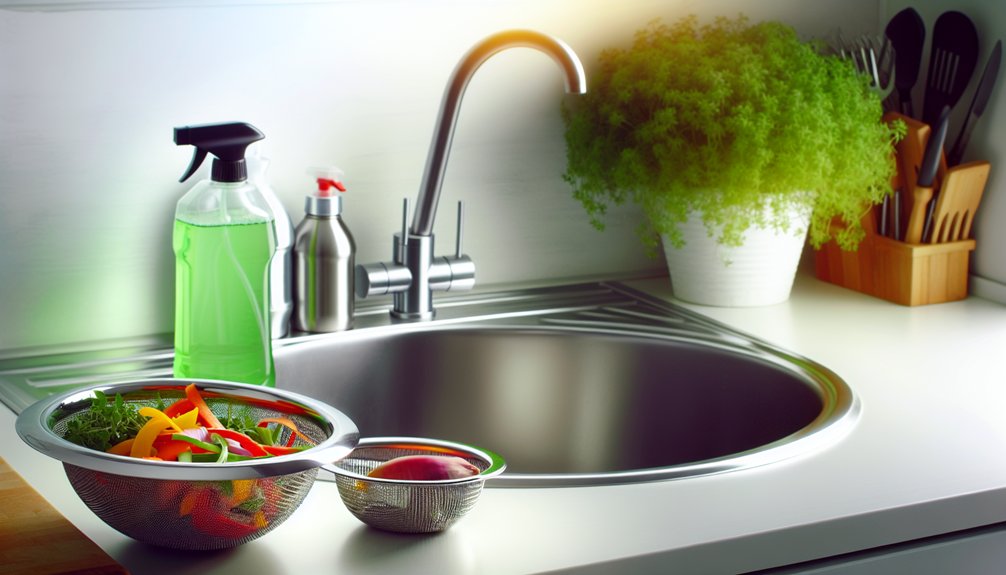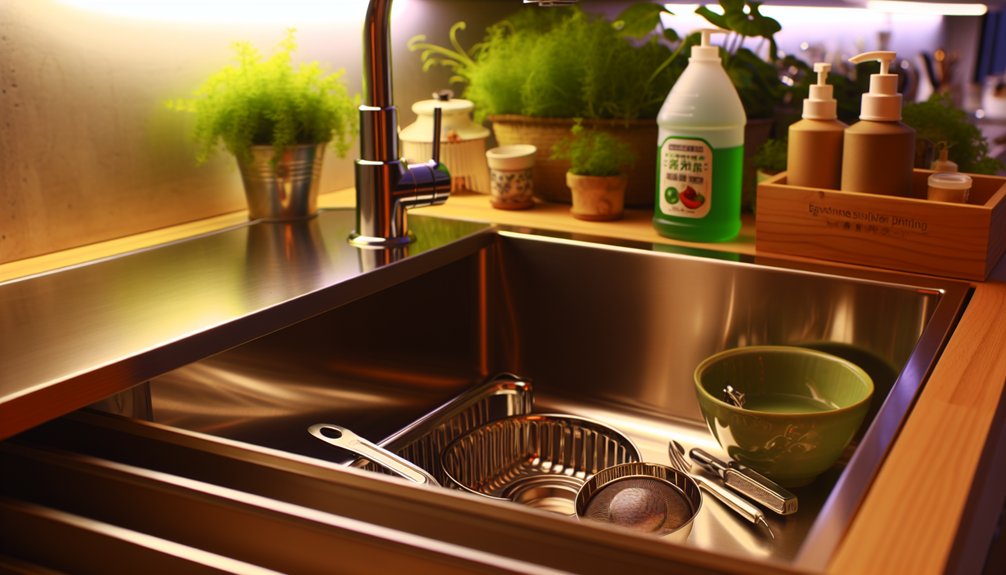To prevent clogged drains, install strainers in sink and shower drains to catch debris. Regularly flush drains with hot water to dissolve grease and food particles. In kitchens, avoid pouring grease down the sink and educate household members about proper disposal methods. In bathrooms, utilize hair catchers and avoid flushing non-biodegradable items. Monthly use of enzyme-based cleaners will help break down organic matter. Additional strategies offer further guidance for effective maintenance practices.
Best Practices for Kitchen Drain Maintenance

Effective kitchen drain maintenance is essential for preventing clogs and ensuring smooth plumbing functionality. Utilizing a drain strainer in the kitchen sink effectively captures food scraps, preventing them from entering the plumbing system where they can lead to blockages. It is vital to avoid pouring grease or oil down the sink, as even minimal amounts can congeal and accumulate, causing significant clogs over time. Regularly flushing the sink with hot water assists in melting any grease buildup, facilitating the movement of small food particles. Educating household members about proper garbage disposal usage can further mitigate clogging issues; problematic items like banana peels and coffee grounds should be avoided. Additionally, maintaining a routine of monthly cleaning with enzyme-based products can break down organic matter, preventing buildup in kitchen drains and ensuring effective drainage function in the plumbing system.
Essential Bathroom Drain Care Tips
While maintaining clear bathroom drains may seem straightforward, implementing essential care tips can greatly reduce the risk of clogs and guarantee peak plumbing performance. Regularly clean drain stoppers in sinks and tubs to remove hair, soap scum, and debris that can impede drainage. Utilizing drain screens or hair catchers in shower drains is effective for capturing hair, preventing it from entering the plumbing system. Educating household members to avoid flushing anything other than toilet paper is vital, as excess paper can lead to significant clogs. Scheduling monthly use of bacterial drain cleaners, which are biodegradable, helps break down organic matter, ensuring drains function at their best. Additionally, establishing a routine of rinsing shower and sink drains with hot water weekly aids in dissolving accumulating soap residue and grease, further enhancing efforts in preventing clogged drains. Implementing these practices fosters a liberated, trouble-free bathroom environment.
General Preventative Measures for All Drains

To maintain ideal drainage across all plumbing systems, implementing general preventative measures is essential. Regular installation and maintenance of drain strainers effectively prevent solids, such as food and hair, from entering the drain, greatly reducing the risk of clogged pipes. Additionally, flushing drains with hot water weekly aids in dissolving grease and food particles, ensuring clear water flow. It is vital to educate all household members about appropriate disposal practices, discouraging the introduction of grease, food scraps, and non-biodegradable materials into the plumbing system. Monthly use of enzyme-based cleaners can further break down organic matter, preventing buildup and promoting a healthier drainage environment. Establishing a routine for cleaning drain stoppers and screens is also advisable, as this removes hair and debris that can lead to slow drainage or blockages. By adhering to these practices, homeowners can effectively maintain their drains and avoid costly plumbing issues.
Frequently Asked Questions
What Can I Put Down My Drain to Stop Clogging?
To effectively stop clogging in drains, one should utilize drain strainers to capture food particles, thereby minimizing grease buildup. Implementing regular maintenance, such as flushing drains with hot water, aids in dissolving soap scum. Additionally, employing drain cleaners can help maintain clear pathways. Incorporating hair traps is also essential, as hair can greatly contribute to blockages. These preventative measures create a proactive approach to maintaining drain functionality and preventing future clogs.
How to Stop Drains From Getting Blocked?
Nearly 80% of plumbing issues stem from blocked drains, underscoring the significance of preventative maintenance. Regular inspection of plumbing systems can identify potential clogs early. Implementing effective kitchen habits, such as proper food disposal and grease management, alongside bathroom habits that include using hair traps and drain covers, considerably reduces blockage risks. Additionally, consistent drain cleaning and ensuring ideal water flow are essential in maintaining clear drains and preventing future issues.
What Are Three Practices That Can Prevent Clogged Sink Drains?
To effectively prevent clogged sink drains, individuals can adopt several sink maintenance tips. Implementing food disposal methods, such as using a drain strainer, can catch food particles. Observing grease disposal guidelines by avoiding oils in sinks aids in reducing blockages. Regular drain inspections and employing drain cleaning techniques, like hot water flushing, serve as soap buildup solutions. Additionally, utilizing hair catcher options in bathrooms supports preventative plumbing habits, ensuring smooth drainage systems.
Why Should You Never Use Baking Soda and Vinegar to Unclog a Drain?
In the shadowy depths of plumbing, myths swirl around baking soda and vinegar as DIY solutions for clogs. However, their seemingly harmless reactions can lead to disastrous chemical interactions, creating pressure that may exacerbate blockages. Safety concerns arise, as residue builds up over time, inviting future clogs. Professionals advise against these methods, advocating for effective methods like plungers or snakes, ensuring both eco-friendly options and reliable drain cleaning without risking plumbing integrity.


